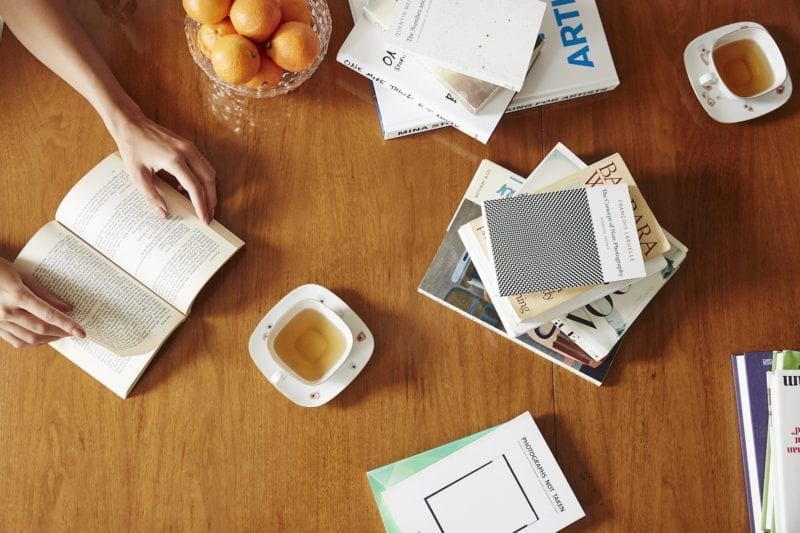Through fresh, inventive use of the very language we speak every day, poetry calls us to pay attention more deeply, gently encouraging us to appreciate the present moment. As such, reading poetry is an attainable method for injecting art, beauty and understanding into our daily lives.
From Shakespeare’s beloved sonnets to Rupi Kaur’s modern take on creative expression, there is a satisfying symmetry and a sense of belonging in relating to a poet’s voice.
Here are 4 reasons to make poetry a part of your life, along with tips on how to enjoy it more fully:
1. Poetry is deeply meaningful.
There is a vast array in styles of poetry. Not every single poem you read will cling to you in a meaningful way. Take heart and know that with a little persistence you will find unique voices and poignant words to warm your soul, speaking to you with the familiarity of an old friend and, at times, as ardently as a lover.
Thanks to Instagram, we live in an age when poetry is readily accessible. We are experiencing a resurgence of the modern poet because of men and women such as Margarite Camaj, Mirtha Michele Castro Marmol, Rupi Kaur, Christopher Poindexter, Cleo Wade and J Iron Word, who are creating beauty with their words.
Perhaps your curiosity revolves more specifically around classic poetry. If that’s the case, then consider delving into this book, which serves as a lovely anthology, showcasing the work of thirteen classic poets from Lord Byron to William Butler Yeats. Alternatively, consider this one for a collection of poetry that also discusses form and history.
You may be inclined to enjoy a specific topic. For instance, poems waxing melodic about love or artfully advocating for human rights may serve to fill your cup. You may naturally gravitate toward certain poetic tools. Imagery, repetition, rhythm or some combination may take hold of you in a powerful way. You may love poetry that is abstract or verses that feel more concrete. Perhaps you adore Shakespeare’s sonnets, T.S. Elliot’s open form work or Emily Bronte’s beautiful, tragic elegy, “R. Alcona to J. Brenzaida.”

2. Poetry is not definitive. It is endlessly interpretable.
Reading poetry is a creative endeavor in and of itself and it can certainly spark inspiration in your own life. You might consider keeping a poetry response journal, documenting the facets of poems that reach out and touch you. Ask yourself, what makes this poem so much more than the sum of its parts?
3. Poetry incites joy through melody.
Poetry, unlike a lot of literature, is designed to be read out loud. In fact, the earliest poetry was spoken or sung. You will experience a poem more fully this way, carrying out sounds and rhythms with your voice. Such poetic tools are incorporated to evoke joy, since human beings are naturally inclined to delight in melody.
Additionally, you are more likely to understand and remember a poem if you take the time to read it out loud. Once a poem is committed to memory, this knowledge serves as a guide to continue learning this age old, yet ever evolving craft.
4. Creating your own poetry is a rewarding endeavor.
Writing poetry is a cathartic practice and a satisfying release of creative energy. The practice of writing poetry can calm your mind and streamline your thoughts. You can use the information you’ve gathered through seeking poetry that speaks to you and begin writing your own.
Here’s how:
Select a topic. Capture a precious moment with your words or respond to something that moves you. Perhaps you just watched the news and a particular story struck a chord. Maybe you just ran your first race, your baby has spoken her first word or you’ve had a pivotal conversation with a loved one, positive or negative.
Select a form. This book is incredibly helpful for breaking down the various forms of poetry that you might select to work with.
Begin writing. Many times, better poetry will result from a spirit of play. Give yourself grace as you learn and make a conscious effort not to be hard on yourself. Instead, nourish your desire to create by allowing yourself to enjoy the process. You may just surprise yourself!
Poetry, in all its beauty and its incredible power to connect us, is not out of reach to anyone. It’s my hope that this piece will help make poetry a part of your life and to begin to enjoy it more deeply.
Do you enjoy poetry? What kinds?
Images via Chaunte Vaughn for Darling Issue No. 17












6 comments
I love ending a day by reading poetry in bed. It’s a nice way to relax not tax my brain before turning out the lights.
A few tips here for creating your own poetry (no ickiness required)!: https://www.kathryndlewis.com/blog/how-to-write-a-love-poem-without-barfing
Hi Katie 🙂 Reading poetry is definitely a great way to end the day. Thank you for sharing your own tips!